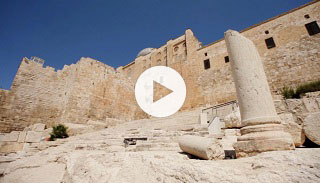10:1–12 The Pharisees test Jesus with a question about the lawfulness of divorce. His response focuses on God’s intentions for marriage. |
10:1 from there Likely Capernaum (9:33), on the north shore of the Sea of Galilee.
10:4 certificate of divorce Refers to the regulations of Deut 24:1–4.
10:5 hardness of heart Refers to their stubbornness (compare Exod 4:21 and note).
10:6 made them male and female A citation of Gen 1:27.
10:7–8 Jesus cites Gen 2:24, explaining that a married couple becomes a unit—God’s intentions are that it not be separated. |
10:11 commits adultery against her See note on Matt 19:9.
10:13–16 Jesus has just taught about marriage and divorce and now teaches about children and faith. |
10:13 disciples rebuked them This reaction is surprising in light of Jesus’ remarks about welcoming children (Mark 9:33–37).
10:15 like a young child Jesus does not identify a specific childlike trait that is necessary to enter God’s kingdom. His similar teaching in 9:35–36 seems to encourage humility (compare v. 23); Jesus could also have in mind that belief in God requires the kind of trust a child has in a parent.
will never enter into it See note on 9:47.
10:17–31 A rich ruler approaches Jesus with questions about eternal life. Jesus indicates that earthly possessions are a significant barrier to entering God’s kingdom. |
10:17 eternal life Refers to life in God’s kingdom—through the embrace of Jesus the Messiah (compare 9:43–48). Although some Jews in Jesus’ day denied the possibility of resurrection and eternal life, many others believed that they would be resurrected and granted entrance into the kingdom of God (compare Dan 12:2).
10:19 You know the commandments See Exod 20:12–17; Deut 5:16–21.
10:21 Go, sell all that you have Compare Mark 8:34–38.
10:24 children Jesus uses familial language to address His disciples and perhaps others who are present.
10:25 eye of a needle Describes an impossible scenario (compare v. 27).
10:29–31 Jesus offers a similar teaching to 8:34–9:1 and 9:35–37—explaining once again that following Him requires sacrifice, but that God recognizes the sacrifice. |
10:32–45 This is the first reference in Mark to Jesus heading toward Jerusalem. Jesus’ prediction of His death (vv. 32–34) is contrasted with James and John seeking places of honor (vv. 35–41). Jesus responds by revisiting His teaching about the least and the greatest (vv. 42–45; compare 9:35; 10:31). |
10:32 up Because Jerusalem was at a high elevation relative to the rest of Israel, it was common to speak of going up to the holy city.
10:33 will be handed over Jesus said earlier that He would be handed over to human authorities (Mark 9:31), but this is the first time He explicitly identifies those who will arrest Him.
chief priests See note on Mark 11:18.
10:37 sit one at your right hand and one at your left James and John apparently think that Jesus is going to Jerusalem to set up the kingdom of God. Although Jesus has just predicted His death for the third time, they do not grasp the nature of His mission.
10:38 cup that I drink Refers to Jesus’ death. See note on 14:36.
10:39 You will drink the cup Jesus seems to be referring to suffering and perhaps dying for the sake of the gospel.
10:40 those for whom it has been prepared Jesus indicates that God the Father decides who has particular privileges or honor in the kingdom of God.
10:45 Son of Man See note on 2:10.
did not come to be served, but to serve In Dan 7:14, the Son of Man is given authority and glory. Jesus seems to identify the Son of Man with Isaiah’s Suffering Servant, who bears people’s iniquities and carries the sin of many (Isa 53:11–12).
ransom for many In the Septuagint (the Greek translation of the ot), the Greek term used here, lytron, often designates monetary compensation given to a wronged party in lieu of capital punishment for the perpetrator (e.g., Exod 21:29–30; 30:11–16; Num 3:11–13).
10:46–52 On His way to Jerusalem, Jesus heals a blind beggar. This is the final healing miracle recorded in Mark. The blind man receives his sight by believing that Jesus is the Messiah—unlike the blind generation who will reject Jesus shortly. |
10:46 Jericho Located five miles west of a major crossing of the Jordan River. Jericho was the only large settlement that a traveler would pass through when going up from the Jordan Valley to Jerusalem. Jericho held a significant role in Israel’s history (Josh 6).
10:47 Son of David The first time Jesus is called by this title in Mark. The ot prophesied that the Messiah would be a descendent of David (Isa 11:1–5; Jer 23:5–6; Ezek 34:23–24; compare 2 Sam 7:16). Although Bartimaeus’ use of this title has clear political implications, Jesus does nothing to silence him, suggesting that Jesus is now ready for His identity to be widely known (compare Mark 1:34 and note).
10:52 your faith has healed you The man’s recognition that Jesus is the Messiah prompts Jesus to heal the man.
 Miracles of Jesus Table
Miracles of Jesus Table

|
About Faithlife Study BibleFaithlife Study Bible (FSB) is your guide to the ancient world of the Old and New Testaments, with study notes and articles that draw from a wide range of academic research. FSB helps you learn how to think about interpretation methods and issues so that you can gain a deeper understanding of the text. |
| Copyright |
Copyright 2012 Logos Bible Software. |
| Support Info | fsb |
 Loading…
Loading…


